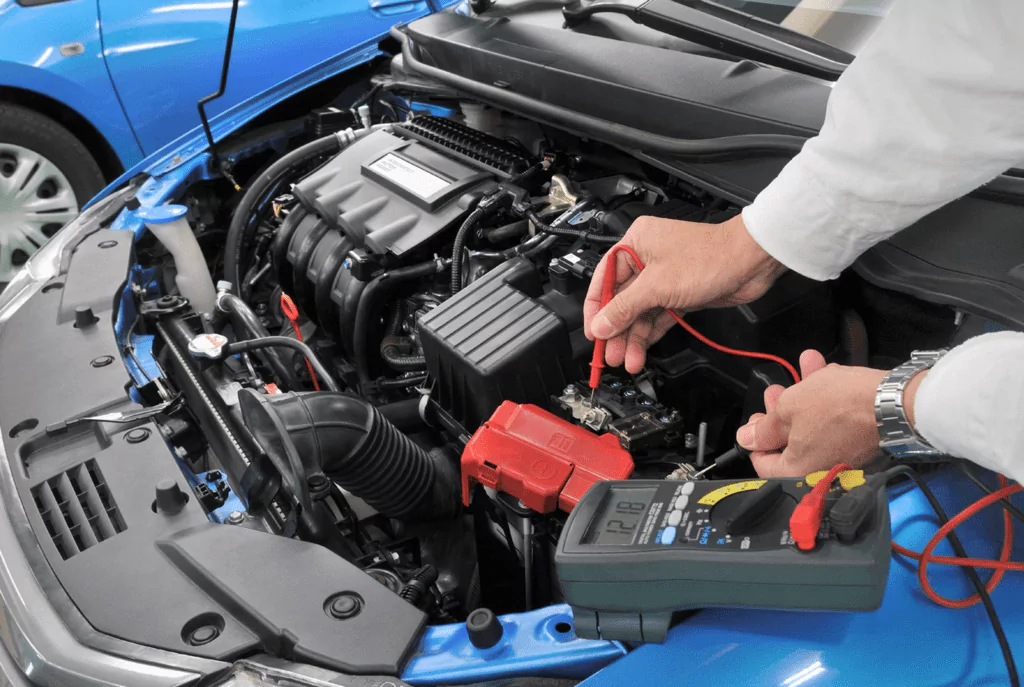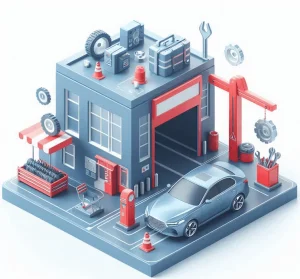Table of Contents
Discover the keys to electrical car repair in this empowering guide. Learn how to tackle common issues and ensure a brighter future on the road.

In today’s ever-evolving automotive landscape, a profound transformation is taking place, and it’s electrifying. With a growing focus on sustainability, the rise of electric vehicles (EVs) is not just a trend; it’s a revolution. As more and more drivers switch to electric cars, understanding the intricacies of electrical car repair becomes paramount.
This comprehensive guide aims to be your guiding light in this electrifying journey. Whether you’re a seasoned car enthusiast with a penchant for tinkering under the hood or a new EV owner filled with curiosity and questions, you’ve come to the right place. Here, we’ll unravel the mysteries of electrical car repair, equipping you with the knowledge and confidence to navigate this exciting world.
The road ahead promises cleaner, greener, and more sustainable transportation. By mastering electrical car repair, you’re not just becoming a more informed car owner; you’re contributing to a brighter, eco-conscious future. So, fasten your seatbelt and get ready to embark on a journey that empowers you with the skills and insights needed to keep your electric vehicle running smoothly.
Electrical Car Repair: Unveiling the Basics
To embark on a journey of mastering electrical car repair, it’s imperative to start with the fundamentals. Electric vehicles (EVs) are, in many ways, similar to their gasoline-powered counterparts, but they also have unique features that set them apart. Let’s take a closer look at the inner workings of an electric car to build a solid foundation.
The Heart of the EV: Battery Pack
Imagine the battery pack of an electric car as its beating heart. This powerhouse is responsible for storing and delivering the electrical energy that propels your vehicle. Understanding your EV’s battery pack is crucial because its health directly impacts your car’s performance and range.
The Silent Powerhouse: Electric Motor
At the core of every electric car is an electric motor. This ingenious piece of engineering takes the electrical energy from the battery and transforms it into mechanical energy, propelling your car forward. Unlike traditional combustion engines, electric motors operate silently and efficiently, making for a smoother and quieter ride.
Power Management: The Controller
Think of the controller in an electric car as the conductor of an orchestra. It regulates the flow of power from the battery to the motor, ensuring that the right amount of electricity is delivered when you hit the accelerator pedal. This precise control not only enhances performance but also contributes to energy efficiency.
Fueling Up: The Charging System
Charging an electric car is a different experience from filling up a gas tank, but equally essential. Your EV can draw power from various sources, including public charging stations, home chargers, and regenerative braking. Understanding how to charge your car effectively is crucial to ensure you always have enough juice for your journeys.
Creature Comforts: Auxiliary Systems
Electric cars come equipped with various auxiliary systems that provide you with all the comforts and conveniences you’d expect from a modern vehicle. These systems manage everything from air conditioning to power steering, ensuring a seamless driving experience.
Mastering the inner workings of an electric car is akin to learning the anatomy of a living organism. It’s about understanding how each component plays a vital role in the overall performance of your vehicle. Armed with this knowledge, you’ll be better equipped to diagnose issues and make informed decisions when it comes to car maintenance and repairs.
As we journey deeper into the realm of electrical car repair, we’ll explore not only the theory but also the practical aspects of keeping your electric vehicle in top-notch condition. Whether you’re a hands-on DIY enthusiast or prefer to leave the repairs to the experts, this guide will empower you to make the right choices for your electric car. So, let’s continue our exploration, and together, we’ll unlock the secrets of electrical car repair.
Common Electrical Car Problems
In the world of electric vehicles (EVs), the road to sustainability is paved with innovation and efficiency. However, like any technology, electric cars are not immune to occasional hiccups and challenges. To ensure a smooth journey in your electric vehicle, it’s essential to be aware of common electrical car problems and how to address them effectively. Here, we’ll delve into some of the issues that EV owners might encounter.
1. Reduced Range
One of the primary concerns for electric car owners is range anxiety. Over time, you may notice that your EV’s range decreases. This phenomenon can often be attributed to the battery pack, which is the heart of your electric vehicle. Batteries degrade naturally over time due to charge and discharge cycles. If you notice a significant reduction in your EV’s range, it may be time to have your battery tested. Depending on the results, you might need to consider battery replacement.
2. Charging Problems
Charging an electric car is usually a straightforward process, but issues can arise. If you encounter problems while charging, start by checking your charging cable and the charging station. Faulty cables or malfunctioning stations can disrupt the charging process. It’s also essential to ensure that your car’s charging system is in working order. Regularly inspect the charging port for debris or damage, as this can affect the connection.
3. Motor Troubles
Electric motors are renowned for their reliability, but they are not invincible. If you start noticing unusual noises, decreased performance, or vibrations while driving, it could be an indication of motor issues. Such problems should not be ignored, as the motor is a critical component of your EV. Seek professional assistance to diagnose and address motor-related concerns promptly.
4. Braking System Issues
Electric vehicles often employ regenerative braking systems that recover energy during braking. While these systems reduce wear and tear on traditional brakes, the conventional braking components may still require maintenance. If you experience braking issues, such as reduced effectiveness or squeaking noises, it’s essential to have your braking system inspected and serviced as needed.
5. Software Glitches
Electric cars are essentially computers on wheels, running complex software to manage various functions. Occasionally, software glitches or bugs can affect different aspects of your EV’s performance. These issues can manifest as problems with infotainment systems, connectivity, or even critical vehicle functions. If you encounter persistent software-related problems, consult your manufacturer for updates or solutions.
While these common electrical car problems can be concerning, it’s important to remember that electric vehicles are generally more straightforward and have fewer moving parts than traditional gasoline-powered cars. This simplicity often translates to lower maintenance costs. However, addressing issues promptly and efficiently is key to ensuring your electric car remains reliable and enjoyable to drive.
As we progress through this guide, we’ll delve deeper into strategies for addressing these problems, ensuring that you can handle them confidently. Whether you’re a DIY enthusiast or prefer to rely on professional technicians, the knowledge gained here will empower you to make informed decisions and keep your electric car running smoothly.
Electrical Car Repair FAQs
How often should I service my electric car?
Regular maintenance is crucial to keep your electric car in top condition. It’s recommended to service your EV every 10,000 to 15,000 miles or as advised by your car’s manufacturer. Routine check-ups typically include inspecting the battery, tires, brakes, and other vital components. Staying on top of maintenance ensures your EV performs optimally and minimizes the risk of unexpected issues.
Are electric car repairs more expensive than traditional cars?
Electric car repairs can vary in cost depending on the make and model. However, in general, electric vehicles tend to have fewer moving parts than traditional gasoline-powered cars. This simplicity often translates to lower maintenance costs. On the downside, if your EV’s battery requires replacement, it can be a significant expense. Fortunately, most electric car batteries come with warranties that cover degradation within a certain mileage or time frame.
Can I repair an electric car myself?
Basic maintenance tasks for electric cars, such as tire rotation, checking and topping up fluids, and replacing brake pads, can be performed by car owners with some mechanical knowledge. However, for more complex issues related to the battery, motor, or charging system, it’s advisable to seek professional assistance. Working on high-voltage electrical components can be dangerous without the necessary training and equipment.
How do I find a reliable electric car repair shop?
Finding a reliable electric car repair shop or technician is crucial for the longevity of your vehicle. Look for certified repair centers or technicians with experience in electric car repair. Online reviews and recommendations from fellow EV owners can also be valuable resources. Ensure that the repair shop has the necessary tools and expertise to work on electric vehicles, as they differ significantly from traditional cars.
What should I do in case of an electrical car breakdown?
In the event of an electrical car breakdown, your first step should be to ensure your safety. Pull over to a safe location if possible, turn on hazard lights, and exit the vehicle if it’s safe to do so. Contact roadside assistance if it’s available through your manufacturer or a service provider. If not, have your vehicle towed to a qualified repair shop that specializes in electric cars. Attempting to diagnose or repair the issue yourself is not recommended, especially if it involves high-voltage components.
How can I extend my electric car’s battery life?
Prolonging your electric car’s battery life is essential for maximizing your investment. To achieve this, consider the following tips:
- Avoid frequent deep discharges of the battery. Charge it before it gets too low.
- Charge your EV when the battery is not too hot or too cold, as extreme temperatures can affect battery health.
- Follow the manufacturer’s recommendations for charging, including using the recommended charging level and avoiding excessive fast charging.
- Maintain a regular charging routine to prevent long periods of inactivity, which can lead to battery degradation.
By following these guidelines, you can help ensure your electric car’s battery remains in good health for years to come.





More Stories
Powerful Secrets Every Cars Mechanic Knows for a Smoother, Happier Drive
Transform Your Ride: Discover the Joy of Automotive Refinishing Mastery
Celebrate Automotive Beauty: Proven Auto Restoration Parts for Brilliant Results